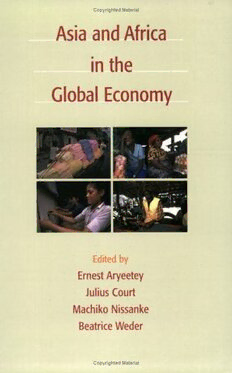
Asia and Africa in the Global Economy PDF
430 Pages·2003·2.496 MB·English
Most books are stored in the elastic cloud where traffic is expensive. For this reason, we have a limit on daily download.
Preview Asia and Africa in the Global Economy
Description:
The performances of Asian and African economies over recent decades has clearly shown that engagement with the global economy can play a key role of advancing development. Researchers and policymakers have paid particular attention to the marked divergence of growth in Southeast Asia and in sub-Saharan Africa. One of the most obvious differences in their performance and economic structure has been the extent of their participation in the global economy. While many East Asian economies have accelerated their integration into the world economy and upgraded their mode of linkages, the majority of sub-Saharan African countries have been increasingly marginalized. What is less clear, however, is the significance of different policy, institutional and structural issues - and the manner in which they have interacted - in explaining the divergent performances of Southeast Asia and sub-Saharan Africa. This book systematically deciphers the different experiences in the two regions as they have interacted with an ever-changing global economy. It provides comprehensive coverage of policies and institutions, focusing on the key sectors of primary exports, resource processing for export, manufacturing, foreign direct investment, financial flows, and official development assistance. This detailed comparative analysis comes at a time when developing countries continue to search for strategies to strengthen their participation in the global economy - and bring more widespread and sustainable benefits to their peoples.
See more
The list of books you might like
Most books are stored in the elastic cloud where traffic is expensive. For this reason, we have a limit on daily download.
